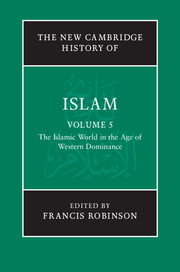Book contents
- Frontmatter
- Introduction
- PART I THE ONSET OF WESTERN DOMINATION C. 1800 TO C. 1919
- PART II INDEPENDENCE AND REVIVAL C. 1919 TO THE PRESENT
- 11 Turkey from the rise of Atatürk
- 12 West Asia from the First World War
- 13 Egypt from 1919
- 14 Sudan from 1919
- 15 North Africa from the First World War
- 16 Saudi Arabia, southern Arabia and the Gulf states from the First World War
- 17 Iran from 1919
- 18 Central Asia and the Caucasus from the First World War
- 19 Afghanistan from 1919
- 20 South Asia from 1919
- 21 South-East Asia from 1910
- 22 Africa south of the Sahara from the First World War
- 23 Islam in China from the First World War
- 24 Islam in the West
- Glossary
- Bibliography
- Index
- References
14 - Sudan from 1919
from PART II - INDEPENDENCE AND REVIVAL C. 1919 TO THE PRESENT
Published online by Cambridge University Press: 28 March 2011
- Frontmatter
- Introduction
- PART I THE ONSET OF WESTERN DOMINATION C. 1800 TO C. 1919
- PART II INDEPENDENCE AND REVIVAL C. 1919 TO THE PRESENT
- 11 Turkey from the rise of Atatürk
- 12 West Asia from the First World War
- 13 Egypt from 1919
- 14 Sudan from 1919
- 15 North Africa from the First World War
- 16 Saudi Arabia, southern Arabia and the Gulf states from the First World War
- 17 Iran from 1919
- 18 Central Asia and the Caucasus from the First World War
- 19 Afghanistan from 1919
- 20 South Asia from 1919
- 21 South-East Asia from 1910
- 22 Africa south of the Sahara from the First World War
- 23 Islam in China from the First World War
- 24 Islam in the West
- Glossary
- Bibliography
- Index
- References
Summary
Sudanese have struggled to forge a national identity within African, Arab, Christian, Muslim and animist traditions. Chronic civil war in Africa’s geographically largest nation has frustrated this quest since independence in 1956. There are regional divisions, and between wealthy urban elites and poor rural farmers. There are issues of politics, a secular democratic society versus a sacred order with a history of militarism and occasional multi-party governments. Petroleum, mainly from the south, has complicated the goal of a stable unitary state. Yet in January 2005 a peace agreement ended decades of civil war between north and south. There is broad relief and optimism that ‘a bad peace is better than a good war’. Still, the Naivasha Accords have not addressed all issues and parties, nor have all past agreements been honoured.
Most Sudanese are Muslims, but significant numbers are Christians and others hold indigenous and syncretic beliefs. Many southern leaders emphasise their Christianity to oppose the Islamist agendas of the Muslim regimes. The Sudan is about a third ‘Northerners’, who may claim an ‘Arab’ identity since Arabic is their first language. A third are ‘Southerners’, a multi-ethnic and multilingual group including Dinka, Nuer, Shilluk, Equatorians and others. Another third are the ‘marginal’ ethnic groups of Darfur, Kordofan, the Nuba Mountains and eastern Sudan. All of these groups have internal diversity, and debatable population sizes.
- Type
- Chapter
- Information
- The New Cambridge History of Islam , pp. 402 - 416Publisher: Cambridge University PressPrint publication year: 2010

